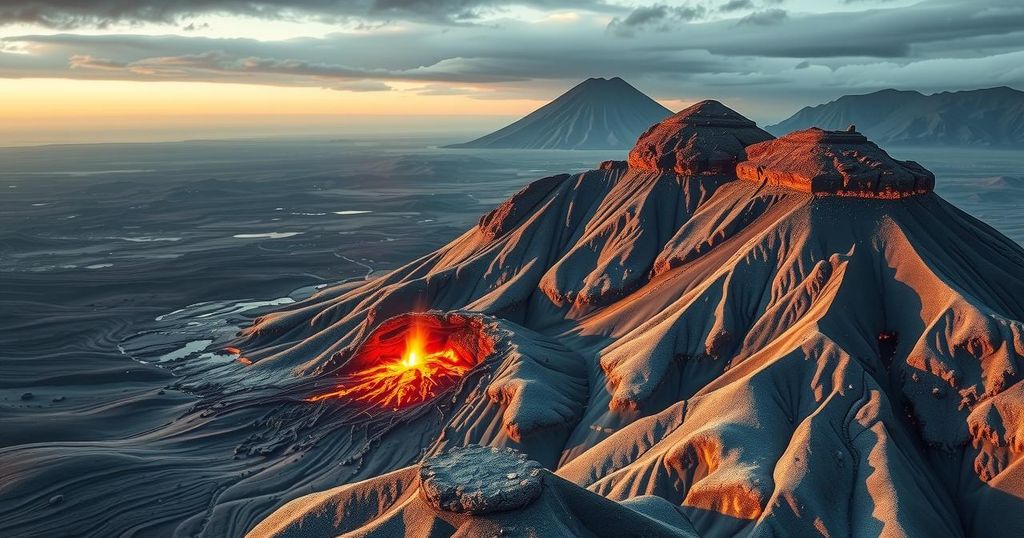World news
ABBAS SHERAQI, ABOMSA, AFRA, AFRICA, AP, BBC, CAIRO UNIVERSITY, CLIMATE, CLIMATE CHANGE, EARTHQUAKES, EGYPT, EGYPTIAN GEO, ETHIOPIA, ETHIOPIA GEOLOGICAL INSTITUTE, ETHIOPIAN GEOLOGICAL INSTITUTE, FENTALE, FLOODING, NATURAL DISASTERS, RENAISSANCE DAM, SHERAQI, US GEOLOGICAL SURVEY, USGS
Michael Grant
0 Comments
Magnitude-5.8 Earthquake and Volcanic Eruption in Ethiopia Prompt Evacuations
On January 4, 2025, Ethiopia experienced a magnitude-5.8 earthquake near Abomsa and Amhara. The earthquake’s depth was reported at 10 kilometers. Concurrently, Mount Dofan erupted, leading to emergency evacuations. Experts warn of intensified seismic activity and potential risks associated with the Grand Ethiopian Renaissance Dam, amid faltering negotiations between Ethiopia, Egypt, and Sudan.
On January 4, 2025, a magnitude-5.8 earthquake affected Ethiopia, impacting the areas surrounding Abomsa and the Amhara region, close to Addis Ababa. The earthquake’s epicenter was reported at a depth of 10 kilometers by both the Ethiopian Geological Institute and the United States Geological Survey (USGS). As seismic activity continues to escalate, experts have warned that tremors may intensify further. Additionally, Mount Dofan in the Afar region has erupted, prompting authorities to recommend evacuations for thousands of residents.
Geological observers have expressed concern regarding the ongoing seismic activity, anticipating that future quakes could surpass the current intensity, which escalated from an initial magnitude of 5.2 to 5.5, and now 5.8. Abbas Sheraqi, an Egyptian geologist from Cairo University, indicated on social media that the current tremors might herald more significant geological disturbances. Furthermore, he cautioned that the eruptions from Mount Dofan could result in increased lava flow, which may affect adjacent volcanic structures, including Fentale, situated in a densely populated region.
The situation surrounding the Grand Ethiopian Renaissance Dam (GERD) remains precarious. Sheraqi emphasized the potential risks, not only for Ethiopians near the dam but also for the populations of Sudan and Egypt, given the dam’s significance as a water reserve for Egypt’s water security. Egypt and Sudan have been pursuing negotiations with Ethiopia for over a decade to secure their water rights concerning the GERD but have faced obstacles due to Ethiopia’s unilateral actions regarding the filling and operation of the dam. The most recent negotiations were deemed unsuccessful, with Egypt attributing the failure to Ethiopia’s unwillingness to agree on effective resolutions that would balance the interests of all parties involved.
Ethiopia has been subjected to increasing geological phenomena, including significant earthquakes occurring in a historically sensitive seismic zone. The recent earthquake, measuring 5.8 in magnitude, is part of a series of tremors that have been reported in this region, raising alarms regarding potentially larger seismic events. Moreover, the eruption of Mount Dofan compounds concerns for local residents as lava flow and ash may threaten populated areas. Alongside these geological events, the political landscape surrounding the GERD creates further tension among Egypt, Sudan, and Ethiopia, reinforcing the broader implications of the natural disasters unfolding. Negotiations between Ethiopia, Egypt, and Sudan regarding the Renaissance Dam have grappled with issues of resource sharing and environmental safety, provoking conflicts over water access and usage rights essential for the livelihoods of millions in the region.
The recent magnitude-5.8 earthquake in Ethiopia heralds an era of increased seismic activity, compelling urgent evacuations and heightening fears over the region’s safety. Coupled with the eruption of Mount Dofan, these events suggest a potential escalation in geological unrest that could endanger nearby populations and critical infrastructure, including the Grand Ethiopian Renaissance Dam. As dialogues between the involved nations falter, the importance of addressing these precarious circumstances becomes ever more pressing.
Original Source: www.egypttoday.com




Post Comment